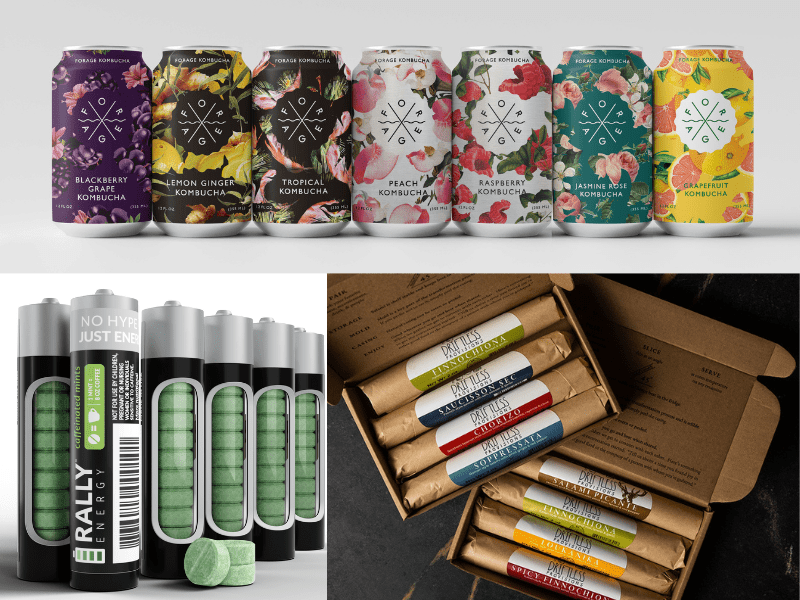If e-commerce wasn’t a priority for food brands before, COVID-19 has certainly made it one. Online food buying had been slower to take off than other e-commerce categories, but the pandemic has given it a serious jolt. According to the New York Times, more than one-third of Americans ordered groceries online for the first time ever last month, and each successive week of this crisis, consumers have spent more money on food online.
Shoppers are still buying from behemoths Amazon and Walmart. But Target, Kroger, Costco, and Instacart are stealing market share fast. There has also been a sharp uptick in food purchases direct from manufacturers and farmers via the internet. Many small brands’ e-commerce sales have blown up, and CSA memberships have risen.
Since there’s no clear end date for the virus threat, stay-at-home orders, or vacant retail shelves, the question for most food brands isn’t if they should sell online—it’s how. Whether starting a business from scratch or pivoting an existing company toward ecommerce, a big part of that strategy is figuring where online to focus.
There are countless platforms: Amazon, eBay, Thrive Market, Instacart, Etsy, Hubba, Boxed, the list goes on—and don’t forgot companies’ own e-commerce websites. Food businesses must also think about where to promote their brand to ensure they are reaching the right audience.
As Tera and Rally Energy founder Matthew Starr discuss in the latest Edible-Alpha® podcast, food entrepreneurs often think they’ll do most of their online business via their own website, but it rarely pans out that way. Even so, it’s crucial to create a polished brand website because that’s where businesses have the most control over their messaging and image. If they can make sales there too, bonus, but know that shoppers often peruse manufacturers’ websites, decide what to buy, then ultimately purchase their products on Amazon.
Although some entrepreneurs hesitate to play the Amazon game, the fact is that’s where a huge percentage of food transactions occur. Therefore, boycotting Bezos means saying no to a significant sales opportunity, something most food businesses can’t afford to do—especially now. Also, if your competitors are on Amazon but you’re not, you’re just giving customers away for free. Without needing to work for those sales, the competitor save margin, free money they can use to choke you in other channels. At the end of the day, even with very little marketing, just having a presence on Amazon will be immensely beneficial.
But again, Amazon isn’t the only game in town. Which other platforms should a food business pursue for sales and promotion? Here is where entrepreneurs, especially those just starting out, need to do some serious digging online. Find out what your potential core consumers are talking about in relation to your category—what truly matters to them—and notice where on the internet they are talking. Immerse yourself in these conversations, ask questions, learn their needs and desires, and observe how they communicate. All of this is invaluable R&D that’ll help food brands find the most fitting homes online.
And now, our roundup of the best food and beverage finance news, events, and resources from around the web…
 Business Model Insights
Business Model Insights
- Online grocery jumped 5 years ahead (Produce Blue Book)
Analysts knew the popularity of online grocery would keep growing steadily—but not this quickly. The COVID-19 pandemic has accelerated growth to expected 2025 levels. As more consumers become comfortable with the process, many will not return to stores even though they can. - Pivoting for Success: Resilience Over Reliance is Required to Protect Our Food Supply Chain (FoodNavigator-USA)
- How to master social media in the time of COVID-19 (New Hope Network)
 Raising Capital
Raising Capital
- 5 Keys To Vetting Investors Before You Accept Funding (Startup Professionals Musings)
“Investor due diligence on a startup is not a mysterious black art, but is nothing more than a final integrity check on all aspects of your business model, team, product, customers, and plan. Reverse due diligence on the investor is a comparable process whereby the entrepreneur seeks to validate the track record, operating style, and motivation of every potential partner.” - Relationships: One of the Many Benefits of Community Banking (Investors Community Bank)
- Forget unicorns, give me a tardigrade (The Intertwine Group)
 CPG/National Brands
CPG/National Brands
-
- ‘Insurgent Brands’ Losing Their Surge (Food Processing)
Disruptive brands slumped from 35% year-over-year growth in January and February to 5% in March and April while companies with established center-store brands, such as Kraft Heinz, Mondelēz International, and Nestlé—have experienced sales spikes. - Become the brand that people remember: How to increase share of market in uncertain times (Nielsen Insights)
- Chobani president: ‘When this is all over, companies will be judged on how they behaved’ (FoodNavigator-USA)
- ‘Insurgent Brands’ Losing Their Surge (Food Processing)
 Market Trends
Market Trends
- Grocery prices see a record-breaking spike as US shoppers continue to stock up at the supermarket during the coronavirus pandemic (Business Insider)
Shoppers experienced sticker shock at the grocery store last month. According to the Bureau of Labor Statistics’ latest Consumer Price Index Summary, the index for “food at home” increased by 2.6%—the largest monthly increase since February 1974. - Top Natural Products Expo West trends remain relevant during pandemic (New Hope Network)
- Future Consumer Index: How COVID-19 is changing consumer behaviors (Ernst & Young)
 Farming and AgTech
Farming and AgTech
- Why old is new again in farming, and why it has the potential to feed and save the planet (GreenBiz)
“It may seem daunting to change how much of the nation produces food. But organic producers have long shown that soil doesn’t have to be mined to be productive. In fact, today’s regenerative practices elevate old ways of farming that predate the industrial era. These practices take more thought, time, and planning, but good things usually do.” - Pandemic on our plates: The high health risks of industrial animal agriculture (Food Dive)
- As Food Supply Chain Breaks Down, Farm-To-Door CSAs Take Off (NPR)
 Deals/M&A
Deals/M&A
- Top 20 Novel Farming System Deals of 2019 (AgFunder News)
In 2019, startups in the category, which includes indoor farms, aquaculture, insect, and algae production, raised $745 million in funding. Investment in novel farming systems grew 38% but with 16% fewer deals. - Harmoni buys Uncle Matt’s Organic from Dean Foods (FoodBev Media)
- Farm Tech investment up 370% in 6 years. How will Covid-19 impact 2020 trends? (AgFunder News)
COVID-19-Related Resources for Food and Ag Businesses
- Edible-Alpha® Huddles for consultants and entrepreneurs. View our previous week’s huddle notes.
- USDA: Get answers to commonly asked questions about how COVID-19 relates to food.
- Farmers.gov: USDA’s farmer-centric page offers info on the status of USDA Service Centers, options for farmers and ranchers nationwide, and answers to frequently asked questions.
- Food Industry Association (known until recently as the Food Marketing Institute): FIA’s website has an entire page dedicated to the virus’s impact on the food industry, including a comprehensive guide “Coronavirus and Pandemic Preparedness for the Food Industry” available for free download.
- Institute for Food Safety at Cornell University: This info-packed webpage provides answers to common food-industry-related questions, a food facility strategy checklist, access to virtual office hours with food safety experts, and much more.
- OSHA: The Occupational Safety and Health Administration offers guidelines for businesses operating during the pandemic to help prevent exposure and infection among employees.
- Department of Labor: The Department of Labor’s Coronavirus Resources portal outlines workplace preparation, employees’ rights, wages and leave, and how to respond if the virus enters the workplace.
- Environmental Protection Agency: EPA provides a list of disinfectants approved for use against the SARS strain that causes COVID-19.
- FDA: Get the latest updates on COVID-19 and info on delayed domestic facility inspections and foreign facility inspections.
- Small Business Administration: SBA is offering designated states and territories low-interest federal disaster loans for working capital to small businesses suffering substantial economic injury as a result of COVID-19. Contact your local SBDC center to help navigate disaster loans.
- American Farmland Trust: AFT’s Farmer Relief Fund will award cash grants of up to $1,000 to help farmers weather market disruptions caused by the coronavirus crisis.

